- Home
- Deborah Harkness
Shadow of Night: A Novel Page 29
Shadow of Night: A Novel Read online
Page 29
“Why, when you see the truth about creatures like Diana and me every day and still deny it?” Matthew sounded weary. He stood. “We will not trouble you again, Mary. Diana will find a witch some other way.”
“Why can we not go on as we have before and speak no more about this?” The countess looked at me and bit her lip, uncertainty in her eyes.
“Because I love my wife and want to see her safe.”
Mary studied him for a moment, gauging his sincerity. It must have satisfied her. “Diana need not fear me, Matt. But no one else in London should be trusted with the knowledge of her. What is happening in Scotland is making people fearful, and quick to blame others for their misfortunes.”
“I’m so sorry about your shoes,” I said awkwardly. They would never be the same.
“We will not mention it,” Mary said firmly, rising to say her good-byes.
None of us said a word as we left Baynard’s Castle. Pierre sauntered out of the gatehouse behind us, jamming his cap on his head.
“That went very well, I think,” Henry said, breaking the silence.
We turned on him in disbelief.
“There were a few difficulties, to be sure,” he said hastily, “but there was no mistaking Mary’s interest in Diana or her continued devotion to you, Matthew. You must give her a chance. She was not raised to trust easily. It’s why matters of faith trouble her so.” He drew his cloak around him. The wind had not diminished, and it was getting dark. “Alas, I must leave you here. My mother is in Aldersgate and expects me for supper.”
“Has she recovered from her indisposition?” Matthew asked. The dowager countess had complained about shortness of breath over Christmas, and Matthew was concerned it might be her heart.
“My mother is a Neville. She will, therefore, live forever and cause trouble at every opportunity!” Henry kissed me on the cheek. “Do not worry about Mary, or about that . . . er, other matter.” He wiggled his eyebrows meaningfully and departed.
Matthew and I watched him go before turning toward the Blackfriars. “What happened?” he asked quietly.
“Before, it was my emotions that set off the magic. Now an idle question is enough to make me see beneath the surface of things. But I have no idea how I animated that bee.”
“Thank God you were thinking about Mary’s shoes. If you’d been examining her tapestries, we would have found ourselves in the midst of a war between the gods on Mount Olympus,” he said drily.
We passed quickly through St. Paul’s Churchyard and back into the relative quiet of the Blackfriars. The day’s earlier frenetic activity had slowed to a more leisurely pace. Craftsmen congregated in doorways to share notes on business, leaving their apprentices to finish up the day’s tasks.
“Do you want takeout?” Matthew pointed at a bake shop. “It’s not pizza, alas, but Kit and Walter are devoted to Prior’s meat pies.” My mouth watered at the scent coming from inside, and I nodded.
Master Prior was shocked when Matthew entered his premises and nonplussed when questioned in detail about the sources and relative freshness of his meat. Finally I settled on a savory pie filled with duck. I wasn’t having venison, no matter how recently it had been killed.
Matthew paid Prior for the food while the baker’s assistants wrapped it. Every few seconds they gave us furtive glances. I was reminded that a witch and a vampire drew human suspicion like a candle drew moths.
Dinner was comfortable and cozy, though Matthew seemed a bit preoccupied. Soon after I’d finished my pie, footsteps sounded on the wooden stairs. Not Kit, I thought, crossing my fingers, not tonight.
When Françoise opened the door, two men in familiar charcoal livery were waiting. Matthew frowned and stood. “Is the countess unwell? Or one of the boys?”
“All are well, sir.” One of them held out a carefully folded piece of paper. On top was an irregular blob of red wax bearing the impression of an arrowhead. “From the Countess of Pembroke,” he explained with a bow, “for Mistress Roydon.”
It was strange to see the formal address on the reverse: “Mistress Diana Roydon, at the sign of the Hart and Crown, the Blackfriars.” My wandering fingers easily summoned up an image of Mary Sidney’s intelligent face. I carried the letter over to the fire, slid my finger under the seal, and sat down to read. The paper was thick and crackled as I spread it out. A smaller slip of paper fluttered onto my lap.
“What does Mary say?” Matthew asked after dismissing the messengers. He stood behind me and rested his hands on my shoulders.
“She wants me to come to Baynard’s Castle on Thursday. Mary has an alchemical experiment under way that she thinks might interest me.” I couldn’t keep the incredulity out of my voice.
“That’s Mary for you. She’s cautious but loyal,” Matthew said, dropping a kiss on my head. “And she always did have amazing recuperative powers. What’s on the other paper?”
I picked it up and read aloud the first lines of the enclosed verses.
“Yea, when all me so misdeemed,
I to most a monster seemed,
Yet in thee my hope was strong.”
“Well, well, well,” Matthew interrupted with a chuckle. “My wife has arrived.” I looked at him in confusion. “Mary’s most treasured project is not alchemical but a new rendition of the Psalms for English Protestants. Her brother Philip began it and died before it was complete. Mary’s twice the poet he was. Sometimes she suspects as much, though she’ll never admit it. That’s the beginning of Psalm Seventy-one. She sent it to you to show the world that you’re part of her circle—a trusted confidante and friend.” His voice dropped to a mischievous whisper. “Even if you did ruin her shoes.” With a final chuckle, Matthew withdrew to his study, dogged by Pierre.
I’d taken over one end of the heavy-legged table in the parlor for a desk. Like every work surface I’d ever occupied, it was now littered with both trash and treasures. I rooted around and found my last sheets of blank paper, selected a fresh quill, and swept a spot clear.
It took five minutes to write a brief response to the countess. There were two embarrassing blotches on it, but my Italic hand was reasonably good, and I’d remembered to spell some of the words phonetically so that they wouldn’t look too modern. When in doubt I doubled a consonant or added a final e. I shook sand on the sheet and waited until it absorbed the excess ink before blowing it into the rushes. Once the letter was folded, I realized that I had no wax or signet to close it. That will have to be fixed.
I set my note aside for Pierre and returned to the slip of paper. Mary had sent me all three stanzas of Psalm 71. I took up the new blank book that Matthew had bought for me and opened it to the first page. After dipping the quill into the nearby pot of ink, I moved the sharp point carefully across the sheet.
They by whom my life is hated
With their spies have now debated
Of their talk, and, lo, the sum:
God, they say, hath him forsaken.
Now pursue, he must be taken;
None will to his rescue come.
When the ink was dry, I closed my book and slid it underneath Philip Sidney’s Arcadia.
There was more to this gift from Mary than a simple offer of friendship, of that I was certain. While the lines I’d read aloud to Matthew were an acknowledgment of his service to her family and a declaration that she would not turn away from him now, the final lines held a message for me: We were being watched. Someone suspected that all was not as it seemed on Water Lane, and Matthew’s enemies were betting that even his allies would turn against him once they discovered the truth.
Matthew, a vampire as well as the queen’s servant and a member of the Congregation, couldn’t be involved with finding a witch to serve as my magical tutor. And with a baby on the way, finding one quickly had taken on a new significance.
I pulled a sheet of paper toward me and began to make a list.
Sealing Waxe
A Signet
London was a big city. And I wa
s going to do some shopping.
17
“I’m going out.”
Françoise looked up from her sewing. Thirty seconds later Pierre was climbing the stairs. Had Matthew been at home, he would no doubt have appeared as well, but he was out conducting some mysterious business in the city. I’d woken to the sight of his damp suit still drying by the fireplace. He’d been called away in the night and returned, only to leave once more.
“Indeed?” Françoise’s eyes narrowed. She had suspected I was up to no good ever since I’d gotten dressed. Instead of grumbling about the number of petticoats she pulled over my head, today I’d added another made out of warm gray flannel. Then we argued about which gown I should wear. I preferred the comfortable clothes I’d brought from France over Louisa de Clermont’s more splendid garments. Matthew’s sister, with her dark hair and porcelain skin, could pull off a gown of vivid turquoise velvet (“Verdigris,” Françoise had corrected me) or a sickly gray-green taffeta (appropriately called “Dying Spaniard”), but they looked ghastly with my faint freckles and reddish-blond curls, and they were too grand to wear around town.
“Perhaps madame should wait until Master Roydon returns,” Pierre suggested. He shifted nervously from one foot to the other.
“No, I think not. I’ve made a list of things I need, and I want to go shopping for them myself.” I scooped up the leather bag of coins given to me by Philippe. “Is it all right to carry a bag, or am I supposed to stick the money into my bodice and fish the coins out when necessary?” This aspect of historical fiction had always fascinated me—women stuffing things into their dresses—and I was looking forward to discovering whether the items were as easy to remove in public as the novelists suggested. Sex was certainly not as easy to arrange in the sixteenth century as it was made out to be in some romances. There were too many clothes in the way, for a start.
“Madame will not carry money at all!” Françoise pointed to Pierre, who loosened the strings of a bag tied around his waist. It was apparently bottomless and held a considerable stash of pointy implements, including pins, needles, something that looked like a set of picklocks, and a dagger. Once my leather bag was included, it jingled at his slightest movement.
Out on Water Lane, I strode with as much determination as my pattens (those helpful wooden wedges that slipped over my shoes and kept me from the muck) would allow in the direction of St. Paul’s. The fur-lined cloak billowed around my feet, its thick fabric a barrier to the clinging fog. We were enjoying a temporary reprieve from the recent downpours, but the weather was by no means dry.
Our first stop was at Master Prior’s bakery for some buns studded with currants and candied fruit. I was often hungry in the late afternoons and would want something sweet. My next visit was near the alley that linked the Blackfriars to the rest of London, at a busy printing shop marked with the sign of an anchor.
“Good morning, Mistress Roydon,” the proprietor said the moment I crossed the threshold. Apparently my neighbors knew me without introduction. “You are here to pick up your husband’s book?”
I nodded confidently in spite of not knowing which book he was talking about, and he pulled at a slim volume that was resting on a high shelf. A flip through the pages revealed that it dealt with military affairs and ballistics.
“I am sorry there was no bound copy of your physic book,” he said as he wrapped Matthew’s purchase. “When you can part with it, I will have it bound to suit you.”
So this was where my compendium of illnesses and cures had come from. “I thank you, Master . . .” I trailed off.
“Field,” he supplied.
“Master Field,” I repeated. A bright-eyed young woman with a baby on her hip came out of the office at the back of the shop, a toddler clinging to her skirts. Her fingers were rough and ingrained with ink.
“Mistress Roydon, this is my wife, Jacqueline.”
“Ah. Madame Roydon.” The woman’s accent was softly French and reminded me of Ysabeau. “Your husband told us you are a great reader, and Margaret Hawley reports that you study alchemy.”
Jacqueline and her husband knew a great deal about my business. No doubt they also were apprised of my shoe size and the type of meat pie I preferred. It struck me as even odder, therefore, that no one in the Blackfriars seemed to have noticed I was a witch.
“Yes,” I said, straightening the seams of my gloves. “Do you sell unbound paper, Master Field?”
“Of course,” Field said with a confused frown. “Have you filled your book with commonplaces already?” Ah. He was the source of my notebook, too.
“I require paper for correspondence,” I explained. “And sealing wax. And a signet. Can I purchase them here?” The Yale bookstore had all kinds of stationery, pens, and sticks of brightly colored, entirely pointless wax along with cheap brass seals made in the shape of letters. Field and his wife exchanged glances.
“I will send more paper this afternoon,” he said. “But you’ll want a goldsmith for the signet so it can be made into a ring. All I have here are worn letters from the printing press that are waiting to be melted down and recast.”
“Or you could see Nicholas Vallin,” Jacqueline suggested. “He is expert with metals, Mistress Roydon, and also makes fine clocks.”
“Just down the lane?” I said, pointing over my shoulder.
“He is not a goldsmith,” Field protested. “We do not want to cause Monsieur Vallin trouble.”
Jacqueline was unperturbed. “There are benefits to living in the Blackfriars, Richard. Working outside the regulations of the guilds is one of them. Besides, the Goldsmiths Company will not bother anyone here for something as insignificant as a woman’s ring. If you want sealing wax, Mistress Roydon, you will need to go to the apothecary.”
Soap was on my list of purchases, too. And apothecaries used distillation apparatus. Even though my focus was necessarily shifting from alchemy to magic, there was no need to forgo an opportunity to learn something more useful.
“Where is the nearest apothecary?”
Pierre coughed. “Perhaps you should consult with Master Roydon.”
Matthew would have all sorts of opinions, most of which would involve sending Françoise or Pierre to fetch what I required. The Fields awaited my reply with interest.
“Perhaps,” I said, staring at Pierre indignantly. “But I would like Mistress Field’s recommendation all the same.”
“John Hester is highly regarded,” Jacqueline said with a touch of mischief, pulling the toddler free of her skirts. “He provided a tincture for my son’s ear that cured its aching.” John Hester, if memory served, was interested in alchemy, too. Perhaps he knew a witch. Even better, he might be a witch, which would suit my real intentions admirably. I was not simply out shopping today. I was out to be seen. Witches were a curious bunch. If I offered myself up as bait, one would bite.
“It is said that even the Countess of Pembroke seeks his advice for the young lord’s megraines,” her husband added. So the entire neighborhood knew I’d been to Baynard’s Castle, too. Mary was right: We were being watched. “Master Hester’s shop is near Paul’s Wharf, marked with the sign of a still.”
“Thank you, Mistress Field.” Paul’s Wharf must be near St. Paul’s Churchyard, and I could go there that afternoon. I redrew my mental map of today’s excursion.
After we said our farewells, Françoise and Pierre turned down the lane toward home.
“I’m going on to the cathedral,” I said, heading in the other direction.
Impossibly, Pierre was standing before me. “Milord will not be pleased.”
“Milord is not here. Matthew left strict instructions that I wasn’t to go there without you. He didn’t say I was a prisoner in my own house.” I thrust the book and the buns at Françoise. “If Matthew returns before I do, tell him where we are and that I’ll be back soon.”
Françoise took the parcels, exchanged a long look with Pierre, and proceeded down Water Lane.
“
Prenez garde, madame,” Pierre murmured as I passed him.
“I’m always careful,” I said calmly, stepping straight into a puddle.
Two coaches had collided and were jammed in the street leading to St. Paul’s. The lumbering vehicles resembled enclosed wagons and were nothing like the dashing carriages in Jane Austen films. I skirted them with Pierre on my heels, dodging the irritated horses and the no-less-irritated occupants, who stood in the middle of the street and shouted about who was to blame. Only the coachmen seemed unconcerned, chatting to each other quietly from their perches above the fray.
“Does this happen often?” I asked Pierre, pulling back my hood so that I could see him.
“These new conveyances are a nuisance,” he said sourly. “It was much better when people walked or rode horses. But it is no matter. They will never catch on.”
That’s what they told Henry Ford, I thought.
“How far is Paul’s Wharf?”
“Milord does not like John Hester.”
“That’s not what I asked, Pierre.”
“What does madame wish to purchase in the churchyard?” Pierre’s distraction technique was familiar to me from years in the classroom. But I had no intention of telling anyone the real reason we were picking our way across London.
“Books,” I said shortly.
We entered the precincts of St. Paul’s, where every inch not taken up by paper was occupied by someone selling a good or service. A kindly middle-aged man sat on a stool, inside a lean-to affixed to a shed, which was itself built up against one of the cathedral walls. This was by no means an unusual office environment for the place. A huddle of people gathered around his stall. If I were lucky, there would be a witch among them.

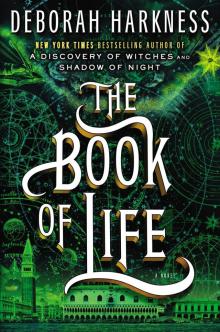 The Book of Life
The Book of Life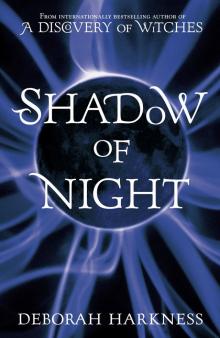 Shadow of Night
Shadow of Night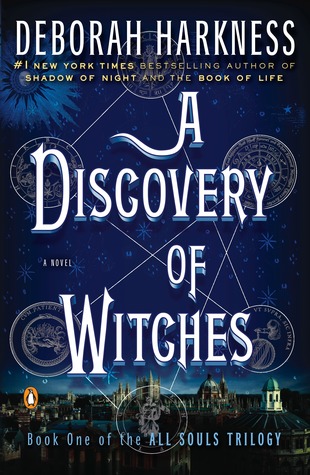 A Discovery of Witches
A Discovery of Witches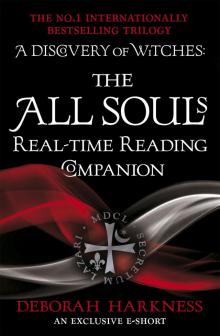 The All Souls Real-Time Reading Companion
The All Souls Real-Time Reading Companion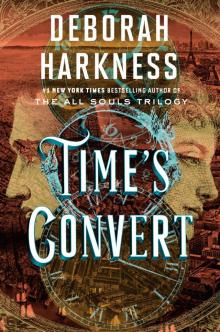 Time's Convert
Time's Convert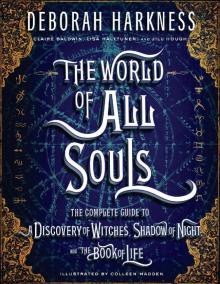 The World of All Souls
The World of All Souls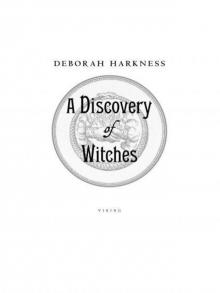 A Discovery of Witches: A Novel (All Souls Trilogy)
A Discovery of Witches: A Novel (All Souls Trilogy)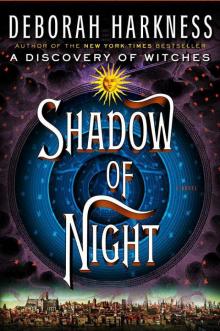 Shadow of Night: A Novel
Shadow of Night: A Novel